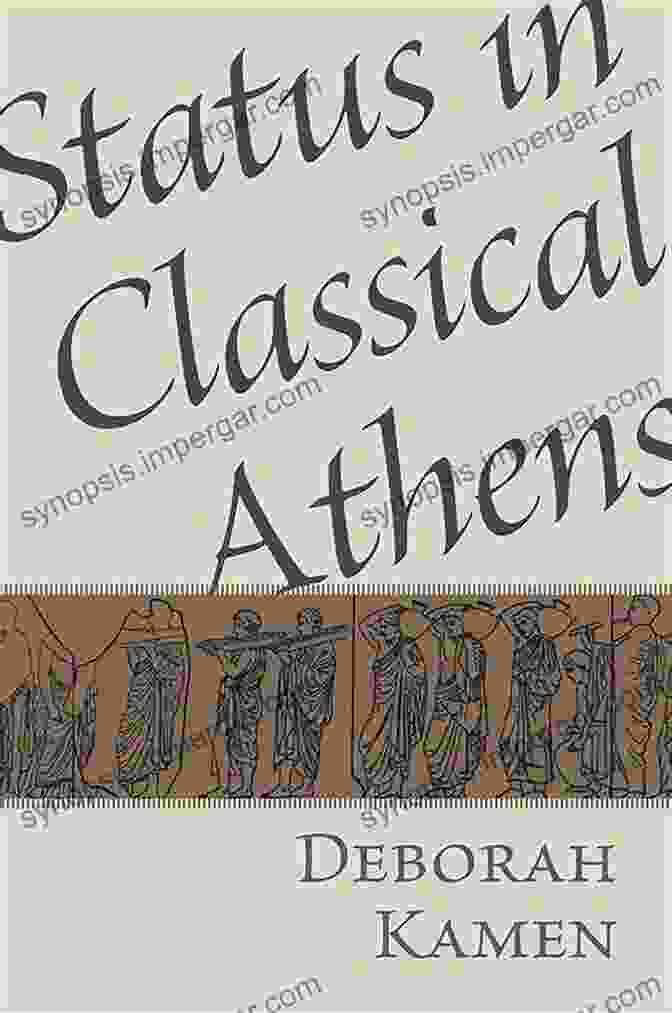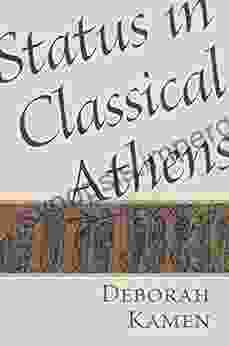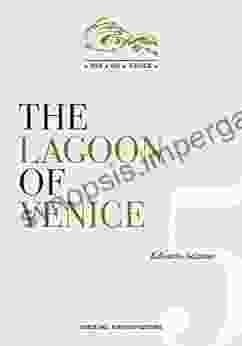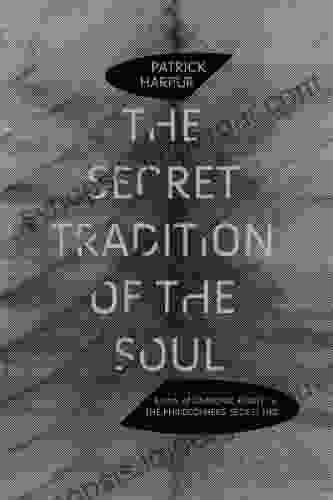Status In Classical Athens by Deborah Kamen: Exploring the Social Order of Ancient Greece

In the heart of ancient Greece, the city-state of Athens stood as a beacon of progress and civilization. Its vibrant culture, democratic principles, and architectural marvels have captivated historians and scholars for centuries. Among the many aspects of Athenian society that have drawn their attention is the intricate social hierarchy that governed the lives of its citizens.
Dr. Deborah Kamen, a renowned classicist and professor at the University of California, Berkeley, has dedicated her research to unraveling the complexities of social status in Classical Athens. Her groundbreaking book, "Status in Classical Athens," published in 2014, has become a seminal work in the field, providing a comprehensive analysis of the factors that determined an individual's place within Athenian society.
4.7 out of 5
| Language | : | English |
| File size | : | 589 KB |
| Text-to-Speech | : | Enabled |
| Screen Reader | : | Supported |
| Enhanced typesetting | : | Enabled |
| Print length | : | 154 pages |

Key Concepts of Social Status
Kamen's book begins by establishing the theoretical framework for understanding social status. She argues that status is a multidimensional construct that encompasses several key elements:
Citizenship
In Athenian society, citizenship was the foundation of status. Only free, adult males born of Athenian parents could claim citizenship. Citizens enjoyed exclusive rights and privileges, including the right to vote, hold public office, and own property.
Wealth
Wealth played a significant role in determining an individual's status. The Athenians categorized citizens into five wealth classes based on their annual income. The wealthiest citizens, known as the "pentakosiomedimnoi," held the highest status and influence in society.
Honor
Honor, or timē, was a crucial aspect of status in Athens. It was a measure of an individual's reputation and social worth, based on their accomplishments, conduct, and lineage.
Repute
Repute, or doxa, referred to the public perception and esteem held for an individual. It could be influenced by factors such as wealth, honor, family connections, and personal qualities.
Kamen demonstrates how these elements interacted and shaped an individual's overall status within Athenian society.
Factors Determining Status
Kamen identifies several key factors that influenced an individual's status:
Birth
Athenian society placed great importance on lineage. Individuals born into wealthy and well-respected families generally enjoyed higher status than those of more humble origins.
Wealth
Wealth was a powerful determinant of status. Rich Athenians could afford to indulge in lavish lifestyles, participate in public affairs, and support the community, which further enhanced their social standing.
Political Office
Holding political office was another means of elevating one's status. Elected officials, such as generals and archons, gained prestige and influence through their service to the state.
Military Service
Military service was highly valued in Athens. Citizens who distinguished themselves in battle or held high military ranks earned honor and recognition, which translated into higher status.
Religion
Religious officials, such as priests and priestesses, held special status in Athenian society due to their connection with the gods and their role in performing rituals and sacrifices.
Education
Education played a growing role in determining status in later periods of Athenian history. Individuals with advanced education, particularly in rhetoric and philosophy, could gain respect and influence within society.
Criticisms and Impact of the Book
Despite its groundbreaking nature, Kamen's book has not escaped criticism. Some scholars have argued that she overemphasizes the role of citizenship and wealth in determining status, while underplaying the importance of other factors such as age and gender.
Nevertheless, "Status in Classical Athens" has had a profound impact on the study of Athenian society. It has shifted the focus from traditional elite-centered approaches to a more comprehensive understanding of the social hierarchy that permeated all levels of Athenian life.
Kamen's work has inspired numerous subsequent studies on social status in ancient Greece and has become a standard reference for scholars and students alike. Its insights have also been applied to other historical and contemporary societies, demonstrating the enduring relevance and applicability of her research.
Deborah Kamen's "Status in Classical Athens" stands as a monumental contribution to our understanding of the intricate social hierarchy that shaped ancient Athenian society. By carefully examining the multifaceted nature of status and the factors that determined an individual's place within it, Kamen has illuminated the complex interplay of citizenship, wealth, honor, and reputation in one of the most influential civilizations in human history.
Her work continues to inspire and inform scholars and students alike, providing a rich and nuanced account of the social Free Download that underpinned Athenian life. Through her groundbreaking research, Kamen has not only deepened our knowledge of the past but also challenged us to reflect on the enduring significance of social status in our own societies.
4.7 out of 5
| Language | : | English |
| File size | : | 589 KB |
| Text-to-Speech | : | Enabled |
| Screen Reader | : | Supported |
| Enhanced typesetting | : | Enabled |
| Print length | : | 154 pages |
Do you want to contribute by writing guest posts on this blog?
Please contact us and send us a resume of previous articles that you have written.
 Book
Book Novel
Novel Page
Page Chapter
Chapter Text
Text Story
Story Genre
Genre Reader
Reader Library
Library Paperback
Paperback E-book
E-book Magazine
Magazine Newspaper
Newspaper Paragraph
Paragraph Sentence
Sentence Bookmark
Bookmark Shelf
Shelf Glossary
Glossary Bibliography
Bibliography Foreword
Foreword Preface
Preface Synopsis
Synopsis Annotation
Annotation Footnote
Footnote Manuscript
Manuscript Scroll
Scroll Codex
Codex Tome
Tome Bestseller
Bestseller Classics
Classics Library card
Library card Narrative
Narrative Biography
Biography Autobiography
Autobiography Memoir
Memoir Reference
Reference Encyclopedia
Encyclopedia Deborah Frethem
Deborah Frethem Dennis Willard
Dennis Willard Carl Ostling
Carl Ostling Miroslav Verner
Miroslav Verner David W S Wong
David W S Wong Lynne Oxhorn Ringwood
Lynne Oxhorn Ringwood Lissa Lucas
Lissa Lucas Deborah Bowman
Deborah Bowman Desmond Morton
Desmond Morton Dean Wesley Smith
Dean Wesley Smith Diane Moczar
Diane Moczar Razaq Adekunle
Razaq Adekunle John Bowden
John Bowden Derek Pua
Derek Pua Deborah A Lott
Deborah A Lott Phillipa Ashley
Phillipa Ashley Mary Jane Grange R N
Mary Jane Grange R N Diane Saxon
Diane Saxon Ellah Wakatama Allfrey
Ellah Wakatama Allfrey David Yetman
David Yetman
Light bulbAdvertise smarter! Our strategic ad space ensures maximum exposure. Reserve your spot today!

 William WordsworthBeginner's Guide to Raising, Feeding, Breeding, and Butchering Rabbits for...
William WordsworthBeginner's Guide to Raising, Feeding, Breeding, and Butchering Rabbits for... Allen ParkerFollow ·13.4k
Allen ParkerFollow ·13.4k Branden SimmonsFollow ·17.5k
Branden SimmonsFollow ·17.5k Hugo CoxFollow ·5.4k
Hugo CoxFollow ·5.4k Kendall WardFollow ·11.9k
Kendall WardFollow ·11.9k David Foster WallaceFollow ·2.4k
David Foster WallaceFollow ·2.4k Albert ReedFollow ·5.7k
Albert ReedFollow ·5.7k Justin BellFollow ·4.8k
Justin BellFollow ·4.8k William GoldingFollow ·3.3k
William GoldingFollow ·3.3k

 Ivan Turgenev
Ivan Turgenev38 Art Made During The Pandemic Digitally Enhanced Art...
By [Author's Name] The year 2024 was a time...

 F. Scott Fitzgerald
F. Scott FitzgeraldAmazing Cooking Guide To South Beach Diet: Your Culinary...
Embark on a...

 Zachary Cox
Zachary CoxGeneral History of Chinese Film: A Journey Through Time...
Origins and...

 Cristian Cox
Cristian CoxUnderstanding Antidepressants: An In-Depth Guide to...
Unleashing the Power of...

 Jeremy Cook
Jeremy CookUnlock the NFT Revolution: A Comprehensive Guide for...
The world of Non-Fungible Tokens (NFTs) has...

 Kevin Turner
Kevin TurnerSeneca and Roman Slavery Under Nero's Rule: An In-Depth...
During the reign of...
4.7 out of 5
| Language | : | English |
| File size | : | 589 KB |
| Text-to-Speech | : | Enabled |
| Screen Reader | : | Supported |
| Enhanced typesetting | : | Enabled |
| Print length | : | 154 pages |










